The medium of comics has tremendously evolved since its inception, yet it still carries a stigma in the public view of a medium that is pedestrian and unsophisticated. It is a constant struggle to rehabilitate it to a middlebrow, if not highbrow, form of art. There has certainly been a shift that occurred in the past decade or so, but the needle moves slowly. It might be why I thought Infinite Bowman by Pat Aulisio was such an interesting proposition. It is an unapologetic remixing of two mythical artists, Jack Kirby and Stanley Kubrick, one of the greatest comic artist and movie director of the 20th century, distilled with stoner comedy humour. It shouldn’t work, but somehow, it manages to become an absolutely stunning sci-fi epic that interrogates how power corrupts, how boredom overtakes even the gods and how the pettiness and shortsighted nature of man refrains us from accomplishing great things.
Infinite Bowman is a collection consisting of the trilogy of Bowman comics, the first issue was published by Retrofit Comics and the second and third issue by Hic and Hoc. This collected edition was released with a final chapter by Hic and Hoc. In Bowman, the first story in the collection, we see the continuing adventures of astronaut David Bowman, the astronaut from 2001: A Space Odyssey who left earth to investigate the monolith that was found orbiting Jupiter. Bowman here is not the smart überscientist and astronaut we know from Kubrick’s film or Arthur C. Clarke’s novel, but more of an Everyman who, through incredible circumstances, came to be on this mission. He is insecure, feels alienated on earth and struggles with the guilt of a past drug addiction. The story diverges dramatically from what we are familiar with once he reaches the other side of the monolith. Instead of emerging as the space child, he crashes on a planet where he meets suburbanite stoner teenagers and spends most of his time reminiscing about Earth and adjusting to his new life situation. Bowman 2016, the second story, finds Bowman 15 years after the crash. He leads a lonely life as a sort of wandering shadow, getting by with his trusty steed, a Garfield-like beast that reminds him of home. During his sojourn on the planet, he comes into contact with Space Gods (one of the many callback to Jack Kirby’s work) and finds a way to control them (through a helmet that also grants him immortality) and becomes the ruler of this world. In Bowman Earthbound, the third story, sees David controlling a vast amount of power in his “Infinite” kingdom. But his power made him complacent and filled with ennui and boredom. He returns to Earth in the distant future and finds a postapocalyptic wasteland, complete with Mad Max-like biker gangs and he has to fight a band of devil worshippers that banish him into Hell. The final story sees Bowman overcoming his status as subordinate to the Devil himself only to find himself even more lost and alone than before as the series ends with Bowman, master of his own destiny, with nothing else to accomplish, no goals or aspirations, free to live eternally, but aimless and lonely.
Infinite Bowman is interesting in many regards. First in its combination of various sci-fi elements from cinema and comics. The iconography of Stanley Kubrick’s 2001: A Space Odyssey, Jack Kirby’s entire sci-fi work, Jim Davis, Matt Groening and many more is absorbed and repurposed to tell the story of a sad man over thousands of years. Aulisio innovation in this comic is the integration of stoner comedy. He appears to be quite fascinated with that type of humour; that became quite apparent when he published comics under the Yeah Dude Comics Press back in 2013-2014 (I had reviewed some of them back on my old, now defunct blog. Some of those titles were very good, some were lacking). Now I’m not usually a big fan of this type of humour, but Aulisio is able to use these comedic tropes to great effect. The trippy voyage of Bowman through the monolith is replaced by a bad drug trip with aliens. It is lowering the cultural cachet of Kubrick’s revered classic to a Cheech & Chong farce. Aulisio manages to lower the cultural status of his highbrow references to put it on a playing field with the rest of the lowbrow elements at play and somehow, it elevates them all. Mixing stoner comedy with Kubrick and Kirby shouldn’t work, but it manages to stay reverential to the trippy nature of these original works while adding a layer of humour on top of it all.
Aulisio’s style is particularly interesting. It is incredibly kinetic, there’s this chaotic scribble surrounding his figures. It’s frantic, as if he’s trying to fill the entire page with his eclectic and energized lines. Perhaps one of my favourite stylistic effect in the book is the movement zoom-in. There are multiple pages where there is a sort of zoom in on the action. It’s a really clever way of doing exposition by providing the reader with a sense of the vastness of space and where our protagonist is. Each panel is moving us closer to a specific point, from the confines of space, to a planet, then to the planet’s atmosphere, then closer and closer to landing in a single page. This all could have been incredibly disorienting, but Aulisio include just enough details to situate the reader on the page. Even when there are multiple things happening at once, we never lose that sense of space and where everything is.
Infinite Bowman may be full of stoner comedy, but it also have very affecting moment scattered throughout. Bowman reminisces about his time on Earth (Why can’t the coach see I’m trying my best!), he acquires objects (shoulder pads), and is on an endless journey around his environment trying to either forget, return home or conquer his native homeworld, where he feels he truly belongs. It brings a smart sensitivity to the whole thing. In spite of Bowman’s Godly powers, he never feels like he belongs. He could conquer the entire galaxy, and he does, but it will never complete him. He’ll always be a shortsighted, lonely, depressed jerk.
There’s a minor element that I found absolutely charming. There’s an alien alphabet used throughout the comics to denote when characters are talking a different language than our protagonist. It reminded me of my days of Larping and Dungeons of Dragons games when some of my friends and I had invented this alphabet for our group for secret messages. I still have that piece of paper somewhere in my Player’s handbook version 2.5.
Infinite Bowman came out a few years ago now. I wanted to take a second look because Aulisio is currently working on Survive 300 Million for Retrofit comics and he’s bringing that same energy to his style and storytelling. I’ve been following his progress on his tumblr page and I’m looking forward to seeing it coalesce into a more complete work in full colour. I’m on board for Survive 300 million. It can’t come soon enough.
—
Infinite Bowman
Pat Aulisio
Hic & Hoc Publications, 2015
$15.00


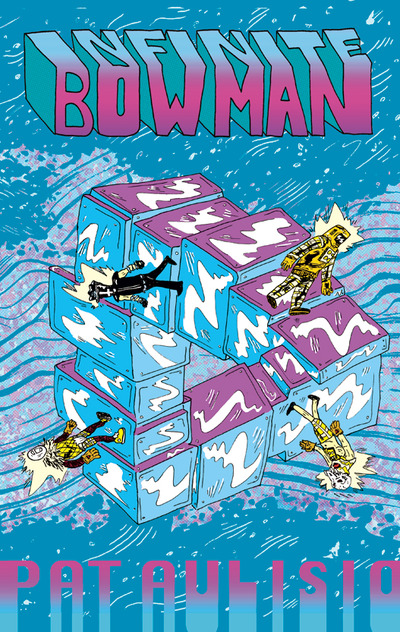
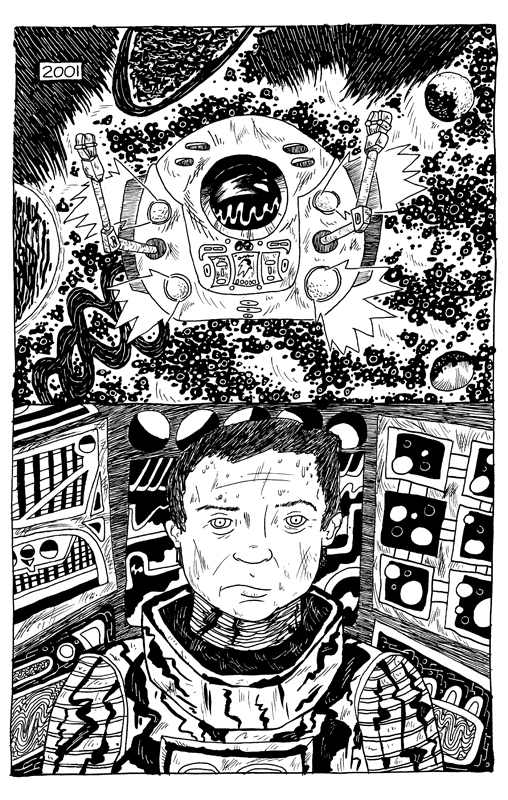
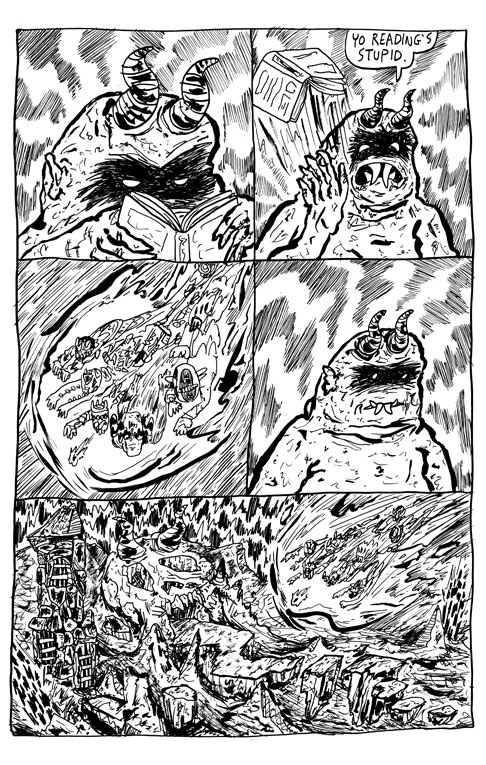
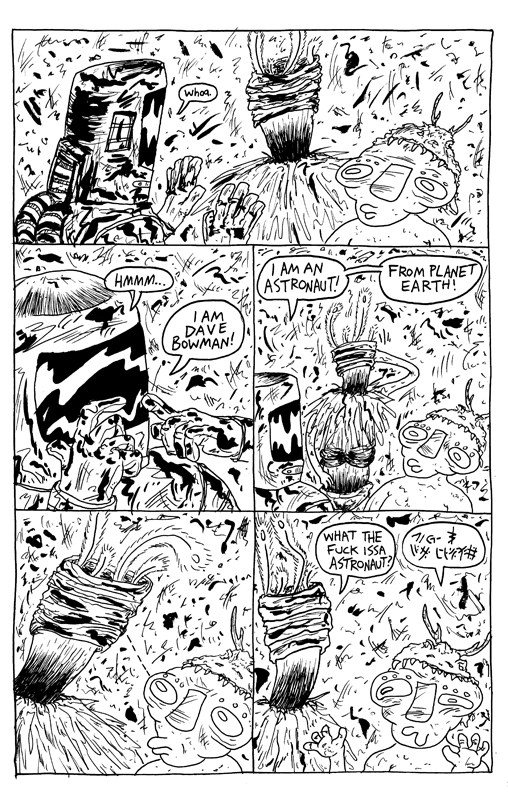


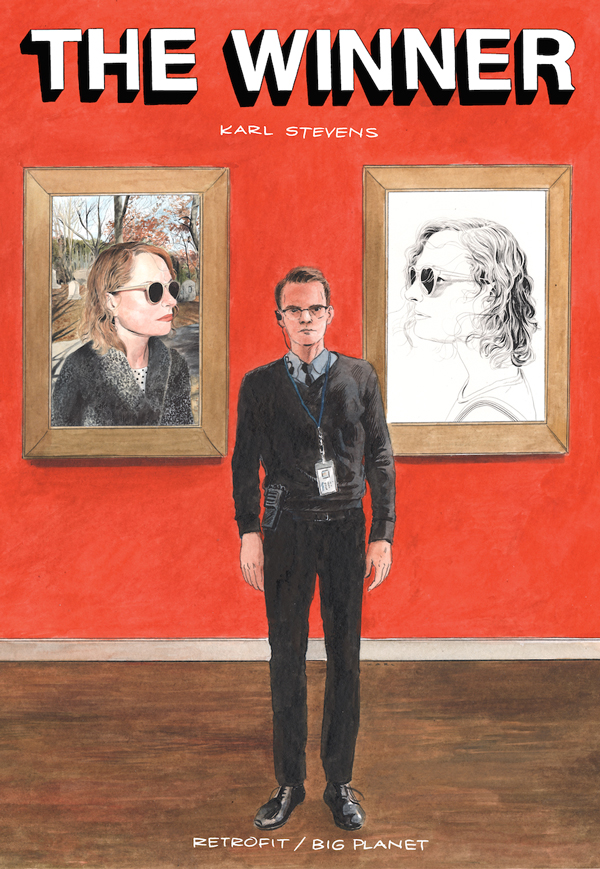



I am interested in picking this up after reading this review. Kirby’s Marvel Treasury adaption of 2001 is fantastic and is an impressive art object. This whole approach sounds like it is in my wheelhouse because it takes 2001 as a starting point and then uses it as a springboard to examine different themes and ideas, such as loneliness. I also grew up on Cheech and Chong and stoner humor works for me.
Comments are closed.